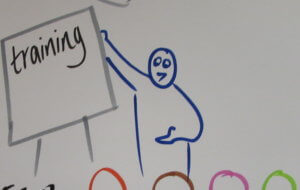
Delivering Coding and Analysis training in Kempston, Bedfordshire

…… please indulge me briefly while I give a little background before I share my experience of working with the guys at Kempston, Bedfordshire. I retired from policing a few years ago, and I was in a lucky position to pick and choose what I did next. I made a decision that after 30 years of public service, most of which was as a detective, I wanted to ‘give something back’. I wasn’t quite sure how this would work, but I was determined that I wanted my new career to have a positive effect on others.
I had already started working part time in academia and I then had the fortune to meet my wonderful colleagues from MutualGain. They are a diverse group of people who are passionate and committed to a cause – just like me; they wanted to help others by sharing their experiences and insights into public service and community engagement.Some the work that I had started within academia related to ‘evidence based decision making’ so, as I started my journey working with MutualGain it was so refreshing that their passion, desire and ethos was underpinned by solid science – these are really talented people that I was working with.
With that as a back drop, I was asked to travel to Bedfordshire to meet part of the team that had been working on delivering a World Café in Kempston. I had been asked to deliver training in the ‘Coding and Analysis’ of data from a strengths based event so we could make sense of the information that the community had presented to us and identify themes that would shape a subsequent Participatory Budgeting (PB) programme.I didn’t get the chance to work with the team until after their World Café, so I felt like I was going in a little out of the loop; a very interesting way to approach the process. I had no preconceptions of the team or the data that we would all be working with. The detective in me wanted to know a little about Kempston, not necessarily about the issues they were facing but just a little background about the town. As I travelled down in the train, I researched the area and, interestingly, saw that Kempston was once ‘the largest village in England’ and existed, arguably, in the shadow of Bedford in the centre of the county. That’s all I knew, so when I ended up arriving a few hours early I went for a walk around the town centre.
I was told that I was meeting the team at Project 229, which was a Community Centre and Café that provided services for the local People in Kempston. As I walked around the town I asked locals about Project 229 and it became clear that it was a service widely used and with a great reputation. An interesting start.Eventually, I met a small but enthusiastic team who were to undertake the coding and analysis process. I was just a little disappointed that we didn’t have more members of the public involved but nevertheless we started our training. The small team did well, but I dwelled on the lack of residents involved. My experience is that after the euphoria of the World Café there can be a temptation to forget about this next crucial stage of preparing the report and coding and analysing is at the core of the development of the report. However, it is vital that the public play a leading role at this stage.
Each World Café has it’s own ‘feel’ and it’s vital that we capture that accurately. We spent time covering the ‘unconscious bias’ of those preparing the data because the final project must reflect what the community has told us as precisely as we can – not our interpretation of it Sometimes the feedback from our communities is not always what we want to hear but we lose credibility if we try to ‘sweep anything under the carpet’. There was no doubt that there were some real challenges in the Kempston community, and the public did not pull any punches about how they felt about the public services. There was an interesting debate during the training on whether the report should have an opening paragraph from a senior police officer, or alternatively from a member of the public. The final decision was to have the staff from Project 229 write a short narrative which I thought was a great idea, considering their obvious standing in the community. The final report was written over the following weeks and after some proof reading by critical friends, including members of the local community, it was published – warts and all. The process now starts for everybody involved to deal with those key themes that the public have told us about.
I thought about my time in policing as a senior officer leading community policing and I reflected as to whether I managed to truly engage with communities in the way that MutualGain is now doing. It really is a privilege to be part of these programmes and to work with communities – especially when we all work on enabling citizens to take ownership and get involved in solving their own issues. As tough as this work is at times, I’ve realised this is what I want to be involved in – this is making a real difference to real people.
So now it is over to the community steering group in Kempston to shape their PB programme. Good luck to all.
Written by Brian Roberts BSC (Hons)
August 2019
